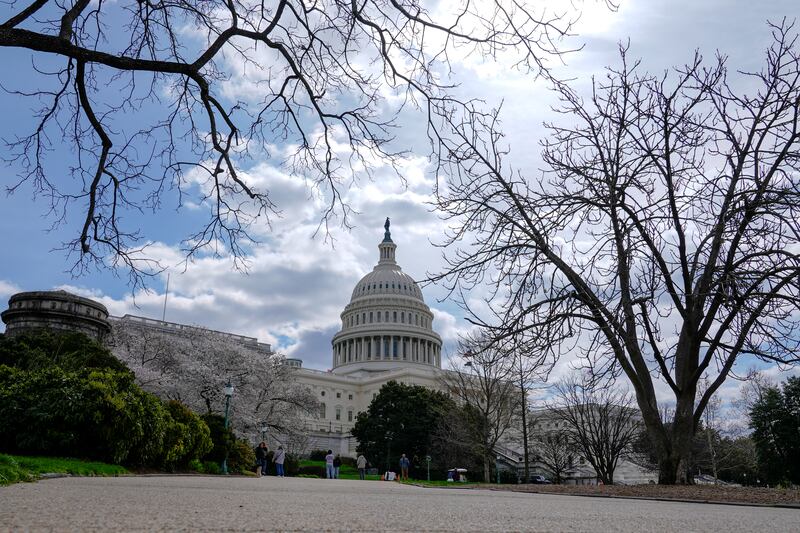In the hours just after the government shutdown deadline of midnight Friday, the U.S. Senate passed the $1.2 trillion spending package approved by the House earlier on Friday. President Joe Biden has already signaled he will sign the bill.
The Senate approved the bill in a 74-24 vote in the early hours of Saturday morning. It was opposed by Utah Sen. Mike Lee, who said in a post on X after the final vote, “This bill could have been so much better had Republicans in either house of Congress stood united in: (1) refusing to fund Biden’s border lawlessness and (2) reining in spending. Doing both was within reach. But some in the GOP were too eager to help Dems spend.”
Sen. Mitt Romney, R-Utah, voted in favor of the bill. In a statement released Saturday, Romney said the bill is “far from perfect,” but provides “critical funding for our military and for border security,” and also is “good for Utah — containing measures that will reduce passport backlogs and support priorities for Hill Air Force Base like the F-35 program and the Sentinel program.”
“Notably, this bill reduces non-defense spending for the first time in nearly a decade, but unfortunately this spending cut will have little effect on our fiscal situation,” said Romney. “Our country’s overspending problems will continue as long as Congress only votes on one-third of federal spending. We must come together to address the main drivers of our national debt and bring our books into balance. I will continue to work with Senator Manchin and others on the Fiscal Stability Act to force Congress to act.”
The spending package was approved in the House with a 286-134 vote, with many conservative Republicans voting against the package. It led to a challenge against House Speaker Mike Johnson, R-La., who has only been in his position since October after former Speaker Kevin McCarthy was ousted.
After the vote, Rep. Marjorie Taylor Greene, R-Ga., said she filed a motion to vacate the chair because she felt “betrayed” by Johnson. In an interview posted to X, Greene said she didn’t think the bill did enough to protect the border and Johnson didn’t give lawmakers enough time to review the bill.
“It’s more of a warning and a pink slip,” Greene told reporters, according to Fox News. “There’s not a time limit on this, it doesn’t have to be forced. ... But I’m not saying that it won’t happen in two weeks, or it won’t happen.”
The spending package covers funding for defense, homeland security, education, and several other federal agencies.
Utah’s all-Republican House delegation was split over support of the $1.2 trillion spending bill. Here’s how Utah’s representatives voted:
- Rep. Blake Moore, who represents Utah’s 1st Congressional District, who is in House leadership, voted in favor of the bill.
- Rep. Celeste Maloy, of Utah’s 2nd District, also voted in favor. She released a statement saying, “One of Congress’ most important jobs under the Constitution is to pass a budget. Doing so requires leadership and compromise, which is often a principled decision. But conservatives came out ahead on this one with critical wins for our national defense and border patrol, including the largest military pay raise in decades and significant cuts to non-defense, non-VA spending.”
- Rep. John Curtis, who represents Utah’s 3rd District, said he voted no on the bill. He said, “As a conservative member of Congress, I strongly oppose omnibus spending bills. I appreciate some of the aspects of this bill such as pay raises for our servicemembers, increasing funding for Border Patrol agents, and prohibiting funding to the scandal-plagued UNRWA. However, we need more reforms to get our house in order, prioritize fiscal responsibility and resist the temptation to engage in wasteful and irresponsible spending. I voted no on this package.”
- Rep. Burgess Owens, of Utah’s 4th District, also opposed the bill. In a statement he said, “I voted ‘no’ on today’s minibus. Allocating more money to further the current administration’s reckless agenda is something I cannot support. We must confront the dire crisis unfolding along our southern border, a scenario both incentivized and facilitated by the policies of President (Joe) Biden. It is imperative that we, as Republicans, seriously prioritize an effective solution.”
The bill funds the government until Oct. 1, when a new fiscal year begins.


